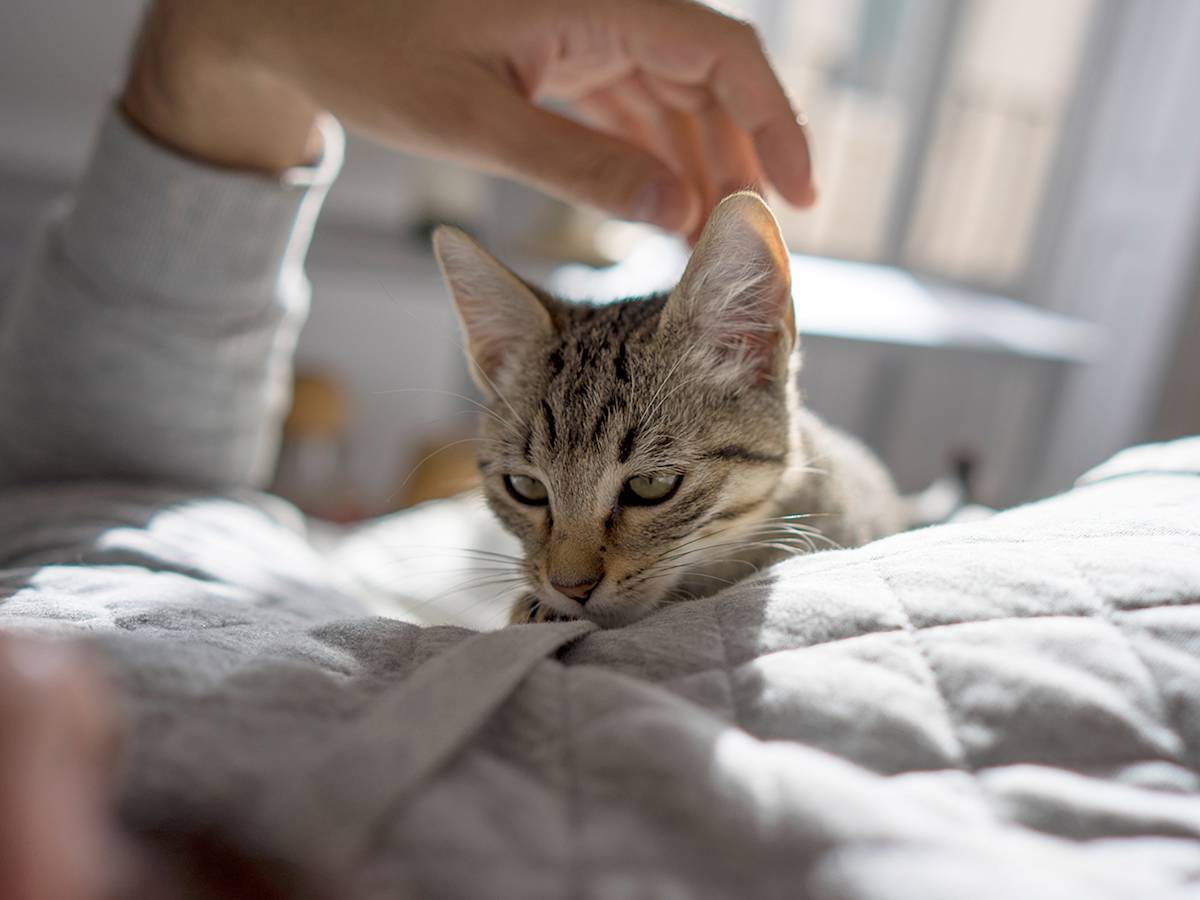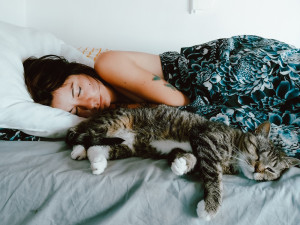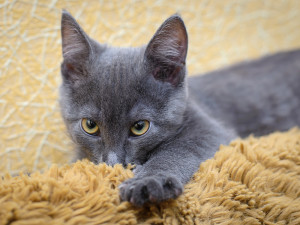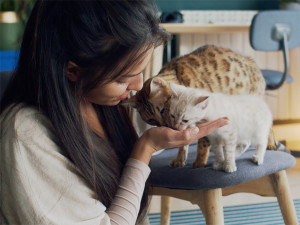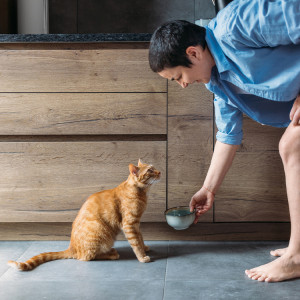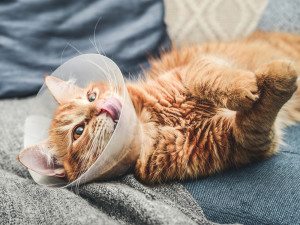Cats seem to think that sleeping on top of their person is the most comfortable position. Sure, it may provide a little pressure therapy the way a weighted blanket does, but if your cat likes to sleep on your chest, stomach, or even your head without asking (or caring if you are comfortable) here’s why and what you can do about it.
Why does my cat choose to sleep on me rather than somewhere else?
Cats sleep on their owners for a variety of reasons, including security, territory, affection, warmth and habit. Regardless of your cat’s reasoning, it is most likely a compliment and you should embrace it if you enjoy the extra company in bed.
Warmth
“Several studies in recent years have shown that cats actually do enjoy the company of people,” says Dr JoAnna Pendergrass. “So, it’s fair to say that cats will cuddle up to their owners for closeness, warmth, and safety.” You might notice that your cat sleeps right on top of you more often in the winter. Street cats huddle up to share body heat – when they’re not scrapping. This also explains why solo cats curl up like doughnuts to sleep. Your cat’s normal body temperature is higher than yours (up to 39C) but if you run hot and need some breathing room, it’s worth investing in a low-wattage heated cat bed or a self-warming one that absorbs and reflects your cat’s own body heat.
Security
Stomach sleepers: does your cat curl up on your bum at night? Don’t worry, it’s not weird – your cat just sees you like a giant body pillow. There’s also the elevation aspect to consider. In the wild, most members of the feline family hide in trees to spot predator and prey alike from a better vantage point, so it’s in a domestic cat’s DNA to feel safer in high places.
Your bed is higher than the ground, and you are higher still. So, naturally, your cat will choose the heated, elevated perch – that would be you. If you want them off your back, buy the tallest cat tree you can find.
Affection or territory
Wondering why your cat sleeps so close to you? That affectionate head-bumping thing they do is called ‘head bunting’ and cats use it to exchange scents with family members. You may not boast specialised scent glands in your forehead, but your cat will still rub their head against yours to pick up your smell and leave theirs behind. Really, it’s a bonding experience, so enjoy it for what it is.
On the other hand, if your cat skips the sentiment and simply plops down to sleep on your head, they may be claiming you as their territory, which has the potential to escalate to spraying urine around the house and stalking other family members. Such territorial behaviour should not be rewarded (with the right to sleep on said head).
Habit
It was cute when your tiny kitten cosied up in the nook of your neck to sleep. Now, you’ve got a 6kg cat to bench press with each breath. “Your kitten may continue to sleep on top of you as an adult because they’ve determined that the warmest and safest place is with you,” says Dr Pendergrass. Cats are creatures of habit, so wriggling out of this routine won’t be easy... but is that what you really want?
Does my cat's sleeping behaviour change based on their age?
As your cat gets older, they tend to need more sleep. Your cat may also need more sleep for other reasons, for example, if they were super active or there’s been a change of environment, like moving house. But if your cat is exhibiting unusual sleep patterns, it may mean they have an underlying health condition, and you should take them to the vet.
What does my cat’s sleeping position mean?
Why does my cat sleep on my chest?
Cats like to sleep on your chest because they can hear your breathing and heartbeat (how sweet). Similar to how purring is soothing to us, cats find our breathing comforting - especially when you’re asleep and relaxed.
Why does my cat sleep on my stomach?
If your cat is sleeping on your stomach, it’s likely a warm, comfy spot that makes them feel safe and close to you. They can also listen to your breathing here.
Why does my cat sleep between my legs?
This is probably just another warm, cosy spot for your cat to curl up. If you just have one, it could be that they are between your legs trying to recreate ‘pillowing’ with another cat.
Why does my cat sleep above my head?
As humans know, your head emits the most heat, so your cat likes sleeping above it because it’s super-warm. Plus, you’re less likely to move your head while you’re asleep. It may also be that your cat likes the unique smell of your head and wants to soak that in while they sleep.
Frequently asked questions
Why does my cat choose to sleep on me rather than somewhere else?
Your cat sleeps on you for four main reasons: for warmth, a sense of security, to show you their affection – or it could just be a habit they’ve established.
Is it normal for my cat to sleep on me every night?
If your cat sleeps on you every night, they probably feel very comfortable and safe there. They could also be expressing their affection for you.
Can I encourage my cat to sleep in a specific spot instead of on me?
You can do things to make another spot more appealing, such as making it cosy and warm, putting it higher up so they feel safe and secluded, and leading them there with treats.
Can my cat’s sleeping habits change due to stress or illness?
It can be hard to tell because cats sleep so much – but if your cat is sick, they will often hide or be less active, in addition to sleeping a lot.
